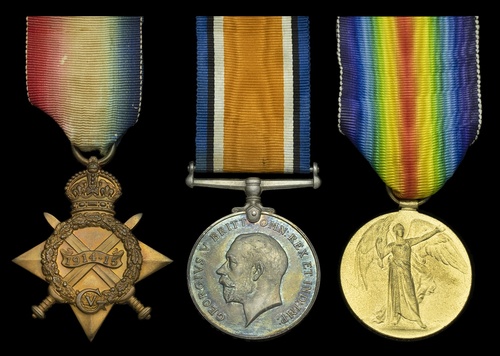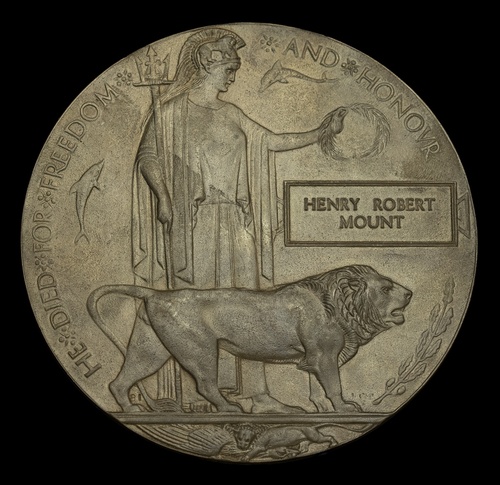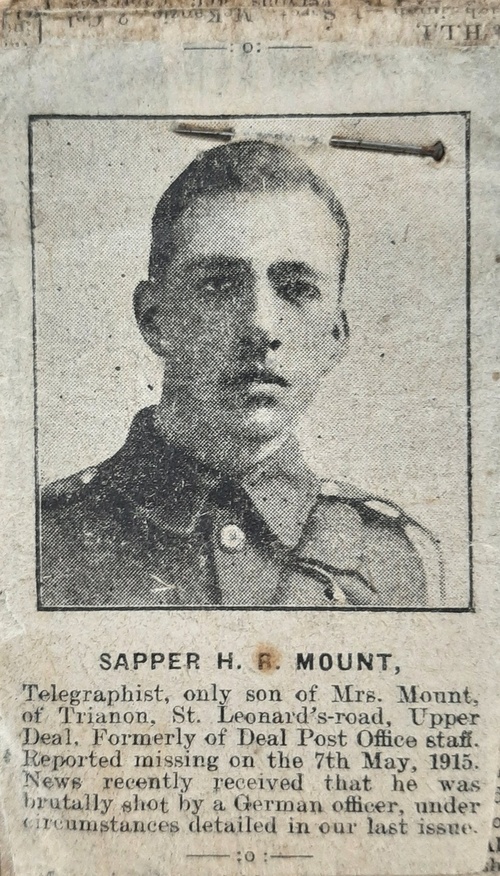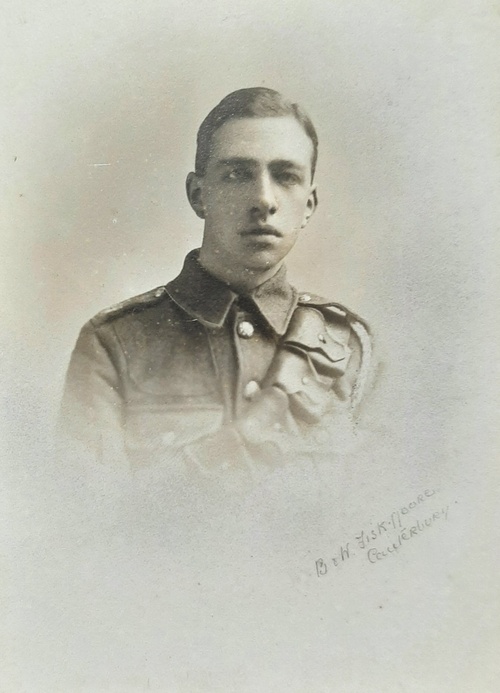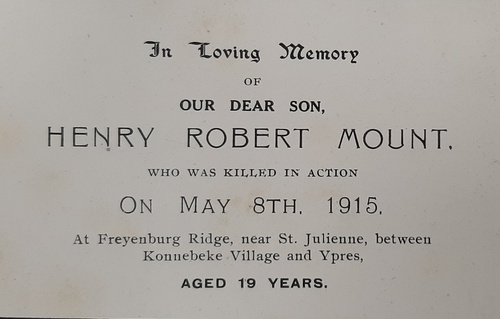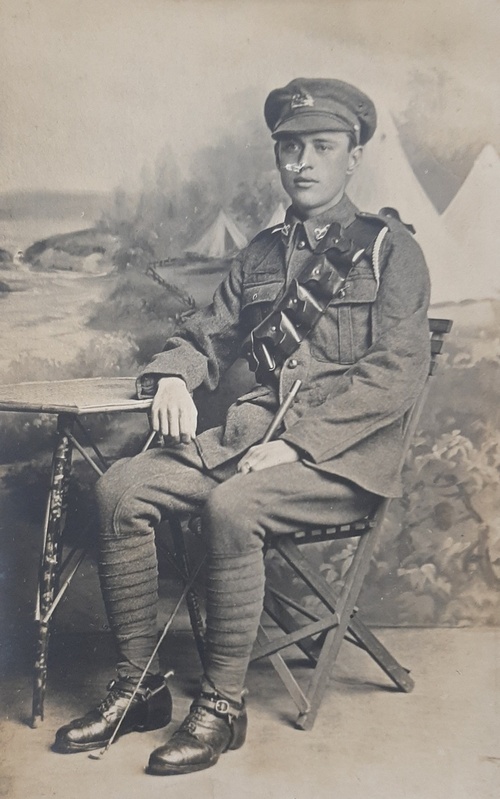Auction: 24003 - Orders, Decorations and Medals
Lot: 119
The tragic and shocking campaign group of four awarded to Sapper H. R. Mount, 28th Home Counties Division, Signal Company, Royal Engineers, who was shot in cold blood by victorious German troops during the Second Battle of Ypres whilst attempting to surrender - it can be considered nothing short of an execution and a War Crime
1914-15 Star (1208 Spr. H. R. Mount. R.E.); British War and Victory Medals (1208 Spr. H. R. Mount. R.E.); Great War Bronze Memorial Plaque (Henry Robert Mount), with its named forwarding envelope and condolence slip, nearly extremely fine (4)
Henry Robert Mount was born at Tonbridge, Kent, in 1896, the son of Henry and Robert Mount of Dartford, Kent. He attested with the Territorial Force, listing his address as 48 Gilford Road, Deal and was embodied for service with the 28th Home Counties Division, Signal Company on 24 November 1914.
Mount entered the war in France on 16 January 1915 and is noted as being 'periodically' attached to the 2nd Battalion, Northumberland Fusiliers. This formation had seen heavy fighting in the Second Battle of Ypres and would go on to see even more however they were in the line on 7 May 1915 when Mount was posted to them as Telegraphist.
On that day he was listed as missing in action and nothing further was known until the arrives of a letter written by a repatriated named Sergeant, A. J. Bosten, Northumberland Fusiliers, who had a vivid and horrifying story to tell.
As the German forces overwhelmed the allied line Mount, accompanied by Bosten was in the Headquarters Aid Dressing Station, both men having been wounded. The order was given for all able bodied men to try and escape and despite being more than fit enough to do so Mount instead assisted Bosten, who had been wounded in the foot, outside.
Here they were stopped by a German soldier, Sergeant Bosten's eyewitness account takes up the story:
'On arriving outside the dug-out, we met a German soldier who accused your son of using dum-dum bullets, this was a distinct also accusation, and the German undoubtedly knew it, but he was desirous of having another victim under any pretext. Your son denied it, as also did I for him as I knew that he did not carry or use a rifle, as with the telegraphists at this period they did not carry arms, as it was very seldom that they went into the first line and so, they therefore had no use of them. The German soldier was not satisfied, and he at once left to fetch a German Officer, The German officer arriving, he made the same accusation against your son, who again denied it, stating that he did not carry a rifle. The German soldier undoubtedly avowed to the officer that he had seen your son use dum-dums as the Officer drew his revolver and shot your son dead. This was murder in cold blood, and I can assure you that I thought my time had come also, but they did not shoot me. I sincerely regretted that I was unarmed at this moment otherwise I would have shot the officer and risked my own life for him, as your son had already done for me.'
Sadly the denials proved useless and Mount was executed in cold blood for a crime he cannot have committed. Bosten was taken prisoner of war and attributed his survival to Mount, claiming that all who remained in the bunker were executed 'with a shovel to the head'.
A local newspaper reported on the incident not long afterwards, stating:
'Brutally shot when wounded
As stated in our last issue, Mrs, Mount of Trianon, Upper Deal (caretaker to ex-Inspector Scantlebury, formerly of the House of Commons police), has received particulars, in a letter from an interned prisoner of war in Switzerland, of the death of her only son, wantonly murdered by a German officer, Spr. Mount was reported missing on 7th May 1915 and subsequently presumed killed, but more than three years have elapsed before Mrs. Mount has been able to obtain and definite details of her gallant son. He was only 19 years of age. Born at Maidstone, he was educated at Maidstone Grammar School and was a member of the choir of the fine old church of All Saints. He was also well known at Ashford, passing first among the competitors in a Post-office entrance examination, he took up duties at Deal Post-office, and subsequently at Sandwich. He was a skilful musician, playing the violin with either hand excellently, and being also a capable pianist and organist. A member of the choir of St. Andrew's, Deal, he played the organ at Sunday afternoon services at that church while in Deal, during the rectorship of the Rev. C.P. Banks. He was also clever with his pencil, and could draw well. He enlisted voluntarily early in the war in November 1914 as a telegraphist, and went to the front in January, 1915. He was an unassuming young fellow, of an affable and affectionate disposition, and was well liked by all who knew him. Mrs. Mount received in 1916, a certificate signed by Mr. Pease, then Postmaster-General, expressing regret at his death "after three years honourable service to the State".
The letter, from a Sergeant of Northumberland Fusiliers, interned as a wounded prisoner of war in Switzerland, and written on 30th July last, was as follows. It gives a vivid description of the brutal methods of Huns who killed men by striking them on the head with shovels.'
Mount is commemorated upon the Menin Gate Memorial; sold together with an archive comprising:
i)
A newspaper article on the recipient's murder.
ii)
Two photographs of him in uniform.
iii)
The forwarding slips for the recipient's medals.
iv)
The boxes of issue and named and addressed envelope of issue for the recipient's medals.
v)
A Royal Engineers button.
vi)
The typed letter from Sergeant A. E. Bosten, quoted in the opening.
vii)
Copied research.
Subject to 20% VAT on Buyer’s Premium. For more information please view Terms and Conditions for Buyers.
Estimate
£1,400 to £1,800
Starting price
£1200

